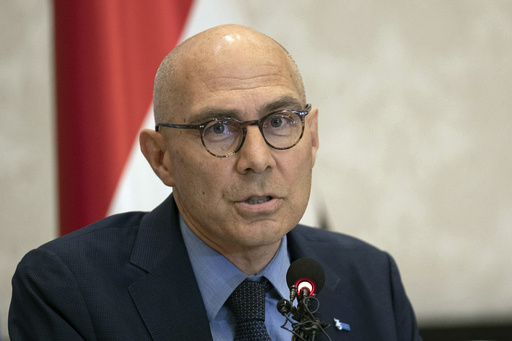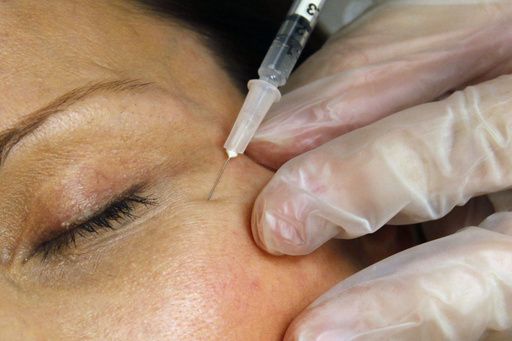A year after a local clinic providing medical care to people in need changed its business model, care providers say they expect to keep adapting to the ever-changing health care and insurance climate.
VIMCare, formerly known as Volunteers in Medicine, celebrated its first year with the new business model in September, operating in a new location at Columbus Regional Hospital’s former emergency room space.
In the 6,000-square-foot refurbished area, the staff saw 1,780 patients in its first year, said Kris Abney, practice manager for VIMCare. In its final year, Volunteers in Medicine saw about 1,400 patients before transitioning to the new care model.
Its mission is to serve the estimated 7,000 newly eligible Medicaid patients in Bartholomew County receiving health insurance benefits under the state’s HIP 2.0 program, which is Indiana’s Medicaid insurance offering, was well as those who are uninsured.
[sc:text-divider text-divider-title=”Story continues below gallery” ]
It takes about $550,000 a year to operate VIMCare, much of it provided through the Columbus Regional Health Foundation, although VIMCare also relies in part on income from operations, Abney said.
VIMCare’s business model calls for about 70 percent of the clinic’s funding to come from state and federal health care reimbursement programs, but also includes the need for fundraising to support programs such as medication assistance, mental health, social work, chronic disease management, tobacco-cessation counseling and others.
The foundation gave more than $450,000 to Volunteers in Medicine in 2015, and estimates it will need to raise more than $360,000 annually for VIMCare in its first three years.
And while statistics tell part of the story, including more than $1.8 million in medication assistance provided to patients in 2016, it isn’t the whole picture of how the medical care safety net in Columbus operates, and how it is changing from its former incarnation as Volunteers in Medicine.
Until 2016, Volunteers in Medicine relied on more than 250 local physicians, nurses, dentists, oral surgeons, pharmacists, social workers, psychologists and therapists, along with community volunteers, who donated their time through the years to provide free medical care.
Although volunteers are still utilized, VIMCare now has a primary care physician on staff, a practice manager, a consulting psychiatrist and a nurse practitioner.
“We see a lot of people who haven’t had access to primary or preventative care, who can’t afford medications. It’s challenging,” said Dr. Amy Baker Hale, VIMCare’s primary care physician, who once volunteered with Volunteers in Medicine while growing up in Columbus.
“What I’m finding – and this happens a lot – the patient has HIP 2.0, but they haven’t been able to find a primary care doctor who takes HIP patients,” she said.
While the state’s HIP 2.0 program was seen by patients as a potential lifeline for health care, it has also proved to be a challenge for Indiana’s medical providers as thousands of patients entered the system but couldn’t find a doctor, she said.
VIMCare is seeing those patients, and staff members have learned that gaps created in care by the lack of primary care doctors result in serious problems down the road — limb amputations from diabetes complications, heart attacks and strokes. Some patients arrive at VIMCare after being diagnosed years before and have not taken the prescribed medication or seen a doctor for followup because they can’t afford it, Hale said.
Who gets helped
VIMCare sees patients who have been admitted through the emergency room, and those who are being discharged from the hospital, but need assistance in obtaining follow-up care.
And often, VIMCare helps with a lot more than just medical care.
Cheri Wildridge, a registered nurse who serves as medication assistance program coordinator, meets with patients who need help obtaining expensive prescriptions, but don’t have the means to pay for them.
At times, it’s a matter of finding a way to meet the need for now as the staff works to find a more permanent solution to keep the patient taking the prescribed medication, Wildridge said. This includes everything from life-saving insulin for diabetics to a recent patient in her 80s who was on at least eight medications at one time.
Working with Bartholomew County’s township trustees and Love Chapel, Wildridge helps patients apply for assistance through various medication programs and to set up a plan for how the patient will follow up and keep on the medication regime.
VIMCare takes full advantage of any free medication or programs that provide ongoing help to patients whenever possible.
In addition to medication, VIMCare is collaborating with departments in the hospital to link patients to life-saving lifestyle programs such as group diabetes classes and other preventative care options.
Navigating the system
For many patients who need medical care, the landscape to find affordable services is so confusing that some have given up, Hale said.
“It’s a complex system to navigate,” the doctor said of trying to figure out how insurance works and how to use the dollars effectively. “It’s a lot harder to fill out an application for insurance than it looks.”
To help patients, VIMCare helps with the complicated forms and connects each patient with available community services, sometimes through United Way of Bartholomew County, Love Chapel and other social services.
Referrals are also being made for patients who arrive at VIMCare with addiction issues, although the clinic is not doing any medically assisted treatment, Hale said. Staff members are collaborating with ASAP, the Alliance for Substance Abuse Progress in Bartholomew County, and referring patients to treatment programs as needed.
Mental health referrals are also being made locally, with VIMCare having the ability to set up counseling appointments and also working with Dr. Sherman Franz, a consulting psychiatrist, for medication referrals when necessary.
VIMCare constantly re-evaluates how it can open up more access to patients, and has added two sessions as walk-in hours on Tuesdays and Thursdays to accommodate people who might not be willing to commit to an appointment.
“We are trying to meet patients where they are,” Hale said. “It’s been pretty popular. It’s open to anybody – and some people who have an acute issue have come in,” she said. “Once we get them here, we become their primary care office and hope to continue to see them, whether it be for preventative care, smoking cessation or services they need.”
Medication assistance
The medication assistance program continues to be by appointment only, due to the large and varied needs each patient has, Wildridge said.
Types of medications that the program provides includes patients needing help with allergies, anxiety/depression, arthritis, diabetes, gastrointestinal disorders, heart disease, hypertension and other chronic illnesses.
By calling the medication assistant program and making an appointment, most patients can be seen the same day, Wildridge said.
While the debate continues in national political circles about how to provide health care and what types of care should be available, Wildridge and Hale said it isn’t something VIMCare focuses on or worries about.
“We have some amazing success stories from patients,” she said. “It is extremely gratifying to help them and see their progress. They are healthier and then they find a job. We see people getting back on their feet,” she said.
As VIMCare moves into its second year, and debate continues on the federal level whether the Affordable Care Act will continue in its current form, Hale said the key will be flexibility and adaptability to whatever happens in health care legislation.
“When patients don’t have preventative care services, they use the emergency room and costs go up,” Hale said. “The emergency room was not designed to manage chronic care issues and it’s not an effective way to deliver primary care.”
VIMCare is a more cost-efficient way to provide the care, she said, but the focus has to be on prevention of serious illnesses.
“We absolutely leave our politics out of this,” she said of the services the clinic provides.
“When I have a patient in front of me with a need, I will do everything I can to meet that need,” Hale said. “We’ve been adapting and we will continue to adapt in this ever-changing landscape. The only certainty we have is that the health system will keep changing.”
[sc:pullout-title pullout-title=”By the numbers” ][sc:pullout-text-begin]
Here are statistics from 20 years of service provided by Volunteers in Medicine and the VIMCare Clinic.
10,500: Patients served
1,780: Patients served in first year of new model, VIMCare Clinic
$5.6 million: Total donated to the effort
$32 million: Total dollar value of medications obtained for patients through Volunteers in Medicine
$1,876,631: Total dollar value of medications obtained for patients through VIMCare in its first year
$189,000: Largest amount raised in the Reverse Raffle (2015)
492: Largest attendance at the Reverse Raffle (2015)
[sc:pullout-text-end][sc:pullout-title pullout-title=”About VIMCare Clinic” ][sc:pullout-text-begin]
Who is eligible?
Patients who are uninsured or those with Indiana’s HIP 2.0 or other Medicaid coverage.
What services does VIMCare provide?
High-quality primary health care to as many low-income Bartholomew County residents as possible, regardless of their ability to pay.
Medication assistance for VIMCare Clinic patients and other low-income Bartholomew County residents.
Behavioral health services, tobacco cessation counseling, chronic disease management, care coordination and connections to community resources.
MARTTI, a digital medical interpreting video conferencing unit offering translations for 60 languages.
What does charitable support for VIMCare provide?
- Medication assistance (free and low-cost medications)
- Mental health and social work services
- Chronic disease management
- Tobacco cessation counseling
- Services for uninsured patients
- Services by a licensed clinical social worker, part-time consulting psychiatrist, case worker and medication assistance program staff
[sc:pullout-text-end][sc:pullout-title pullout-title=”Need help?” ][sc:pullout-text-begin]
To contact the VIMCare Clinic, 2400 E. 17th St., on the campus of Columbus Regional Hospital, call 800-841-4938, Ext. 3662 or 812-375-3660, or visit crh.org/vimcare.
Hours are 8 a.m. to 7 p.m. on Mondays and 8 a.m. to 4:30 p.m. Tuesdays through Fridays.
Walk-in clinic hours are 12:30 to 4 p.m. on Tuesdays and 8 a.m. to noon on Thursdays.
[sc:pullout-text-end][sc:pullout-title pullout-title=”VIMCare’s philosophy” ][sc:pullout-text-begin]
VIMCare adopted Volunteers in Medicine’s mission statement and placed it on the wall in the new offices when the facility was dedicated in August 2016.
It reads:
“We welcome those in need — to come without fear,
And we invite those who serve, to come without pride,
So that their meeting may bring healing and hope to both.”
[sc:pullout-text-end][sc:pullout-title pullout-title=”Medication assistance” ][sc:pullout-text-begin]
VIMCare patients who need medication assistance or those who need medication help should call VIMCare at 812-375-3660 to make an appointment.
The program works with drug companies that have programs for people who have long-term medication needs. Working with the patient’s physician, the program helps patients apply for free or low-cost medicine offered by drug companies.
When coming to the appointment, bring:
- Proof of income for entire household
- Insurance information
- Prescription information (prescription bottle or complete medication list)
- Bartholomew County physician’s name
The program is a community collaboration involving VIMCare, Columbus Regional Health and its foundation, township trustees from Columbus, Clifty, Flat Rock, German, Harrison and Sandcreek townships, Love Chapel and Kroger Pharmacy.
Local donors have made contributions to make the medication assistance program possible.
Anyone wishing to make a tax-deductible contribution is encouraged to contact the Columbus Regional Health Foundation at 812-376-5100 or crh.org/foundation.
[sc:pullout-text-end]






